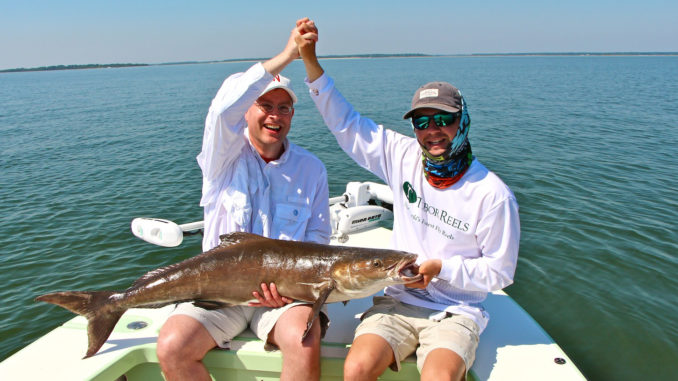
Taking anglers for pay is a job with many facets
Few saltwater anglers have not thought at one point or another about becoming a guide. This is especially true on days when the fishing is more than just a little good and everything comes together perfectly. The thing is, not every day on the water is perfect, the fishing is not always good and the ability to make things happen on days such as that is what sets guides apart from most other fishermen. As with any job, becoming a successful guide takes hard work and dedication, to be a great guide, it takes one more ingredient: passion.
Capt. Owen Plair of Bay Street Outfitters in Beaufort never considered doing anything other than guiding, and while his high-school friends were making plans for college, he was making plans for sea school and a captain’s license.
“Growing up fishing and having the passion for sharing with other people is what really led to me becoming a guide,” he said.
Capt. Patrick Kelly of Captain Smiley Fishing Charters in Myrtle Beach was a college student when he decided that a life spent on the water was for him.
“I have always been passionate about the water, so I dropped out of college, moved to Hawaii, and worked on charter boats and surfed for a few years before coming back home in 2000 and starting my own charter business; I’m definitely where I need to be,” he said.
Obviously, a love for the water and the things that call it home is a prerequisite for guiding, but there is much more to it than just catching fish.
“Many a great fisherman was not able to make it as a fishing guide because you are not just a guide; you are a mechanic, booking agent, accountant, marketer and everything else it takes to keep a small business running,” Kelly said.
As with any small business, there are risks as well as rewards — no 401K or health insurance, either. A well-outfitted boat for inshore guiding can easily cost more than $50,000, an offshore boat much more than that, and routine maintenance and upkeep is a never-ending expense. If the boat isn’t running, neither is the business.
Another factor is something they can do little about, weather.
“A downside to guiding is the weather, because if the weather is really bad, it’s not good for fishing or your clients, and the days you have to cancel are days you aren’t making money — which can be tough if the bad weather lasts for a week or more,” Plair said.
Kelly has to deal with pop-up thunder storms and other weather events common in the Myrtle Beach area; he has learned to depend on technology to help keep his clients safe and on the water.
“Smart phones and weather apps are great when it comes to avoiding storms, because radar is just a click away and makes it easy to decide if moving to another area or calling it a day is required,” he said.
A financially rewarding life is possible with guiding. Many of South Carolina’s top guides will be booked 200 days or more annually, even with weather and other concerns, but those same guides don’t do it just for the money.
“Getting paid for guiding is just a plus for me, because it is about living the lifestyle of being on the water a lot, and loving what you do,” Plair said.
So where does someone start if they want to be a guide? Just getting a captain’s license and placing an ad in the yellow pages will not yield good results; getting established in the business can be a very slow and expensive process. For those who are really serious about becoming a guide Kelly recommends, “Go to work for a reputable business like an outfitter or charter company and learn how to act, how to deal with clients, what kind of services are available, and what it is really like before taking that leap.”
Plair says, “My advice is to make sure guiding is something you want to be devoted to… spending countless hours on the water keeping up with the patterns of fish, staying in tune with your surroundings year-round, and scouting out a lot of different areas because guiding is all about giving your clients the best day catching fish possible, and most of all having a fun, safe and memorable experience.”



Be the first to comment